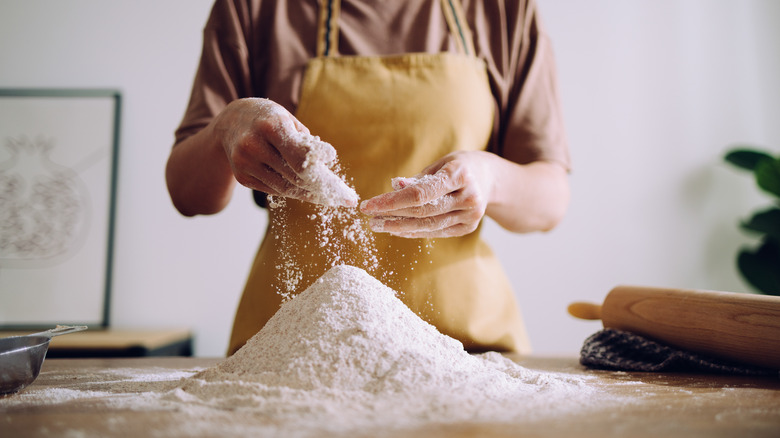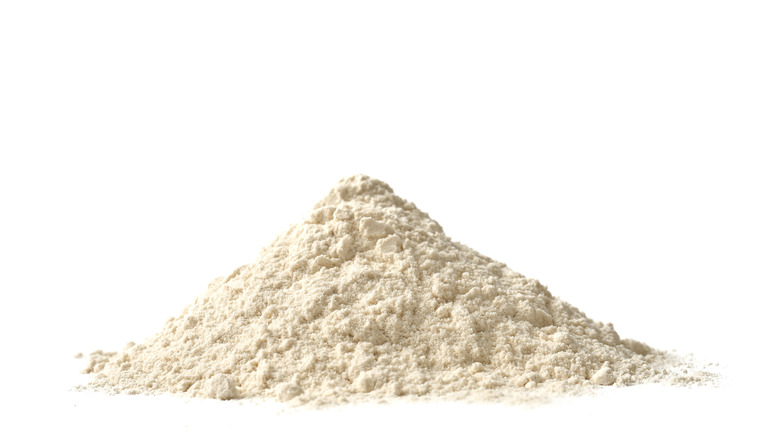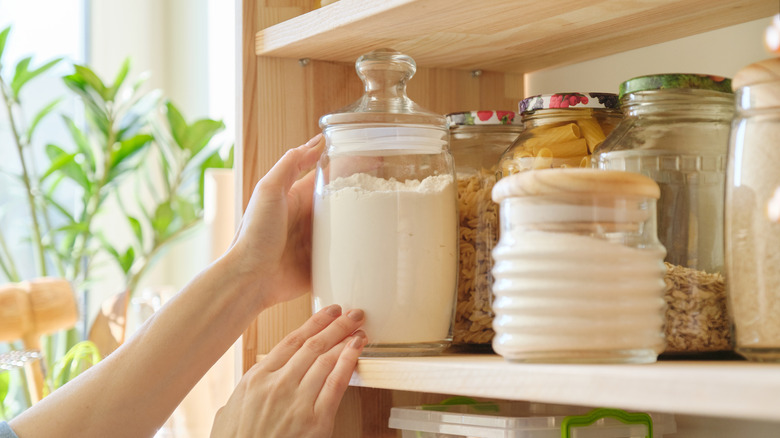It's Probably Far Past Time To Throw Out Your Flour
You know those bags of spinach are living on borrowed time, with maybe a few days before turning soggy. You know better than to let those bean sprouts or mushrooms hang out too long. But baking goods, specifically your flour, probably aren't something you worry about having to replace. Just like other perishable things in your kitchen, flour does indeed turn, and in less time than you may think.
Having fresh, high-quality baking staples like highly rated flour brands, sugar, and spices is important not only for food safety reasons but also for optimal taste and flavor. When stored properly, baking ingredients like sugar, cornstarch, and salt are practically immortal. Short of something like moisture or bugs finding their way into the package, they live on indefinitely. If you've assumed flour also falls into this camp, that isn't quite true. In general, plan to replace flour after 8 months at the most and sometimes less depending on the type of flour and storage method.
Check the package for a stamped-on best-by date to start with, though you should know that your flour may be just fine for about 4-6 months past this suggested date. In general, use your senses to determine if your flour is past its prime. Bad flour will smell funky, sour, or slightly rancid. Texture can change too, becoming clumpy. Finally, if you spot any little black dots or the dreaded brown weevils, which can find their way into pantries, it's time to toss that flour.
What happens when flour goes bad?
If it's news to you that flour goes bad or maybe you're an avid enough baker you've always used yours up before it has the chance to turn, you may not be aware of what occurs when flour passes its prime. Unlike foods where the rot is obvious — think fuzzy spots of mold or sliminess — when flour goes bad it's more of a subtle, gradual, and less obvious situation. The changes that happen aren't so detectable to the naked eye.
Specifically, the structure of flour on a molecular level changes as time passes and other elements come into play. Depending if flour is introduced to moisture or air, different types of rancidity occur. The introduction of water to your flour can make it clumpy or your flour will take on an undesirable texture. A rancid flavor will make its way into your baked goods too. Fungus or mold can even form. Air making its way into the flour container or bag can cause oxidation, which also creates a loss of its once-ideal taste, flavor, and freshness. It can also deteriorate the nutrients in the flour. Luckily, with proper storage methods, you can extend the lifespan of any type of flour and keep it at its freshest and best for many more future cakes, cookies, and breads.
How to store your flour for maximum freshness
Because air and moisture are the main enemies here, storage is key. Keep flour away from temperature fluctuations and in a dry, cool place, in an airtight container. Even with proper storage, various types of flour from gluten-free to chickpea flour to all-purpose will vary in terms of their shelf life. In general, the more processed types of flour like your standard inexpensive bleached all-purpose keep longer. This is because there's less of the original grain left after processing and therefore less oil in the flour. Higher oil content flours like whole grain options contain more of the pieces of the original grain of wheat and therefore are more susceptible to spoilage. Alternative types of flour like almond, coconut, chickpea, or any gluten-free flours are more susceptible to spoilage for the same reasons and may only last anywhere from a month to six months, compared to closer to a year for more traditional flours.
No matter the type though, keeping your flour in an airtight container will extend its lifespan, so don't just open the bag it came in and keep it there. Transfer it to a jar with a tight lid like a mason jar or other storage canister. Better yet, toss it in the fridge or freezer, where even the more whole grain types can last for up to two years when stored properly.


